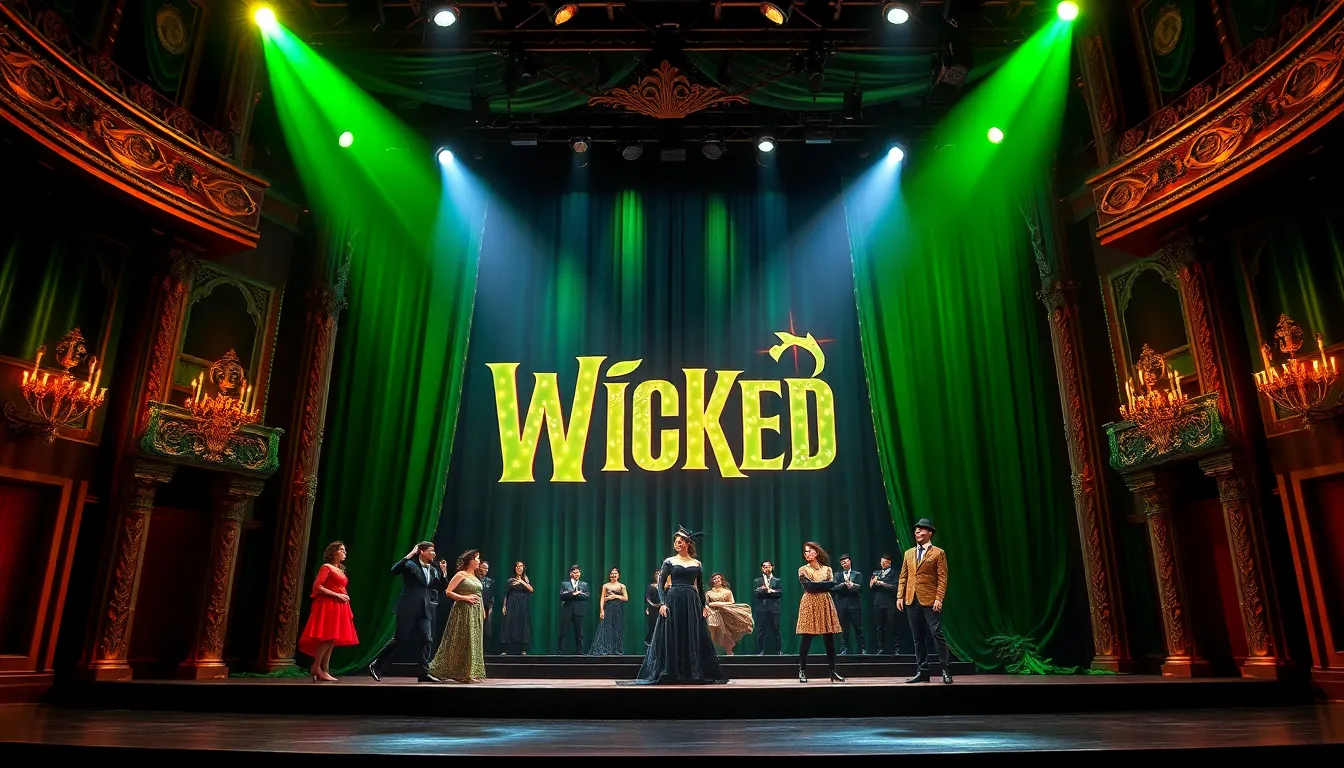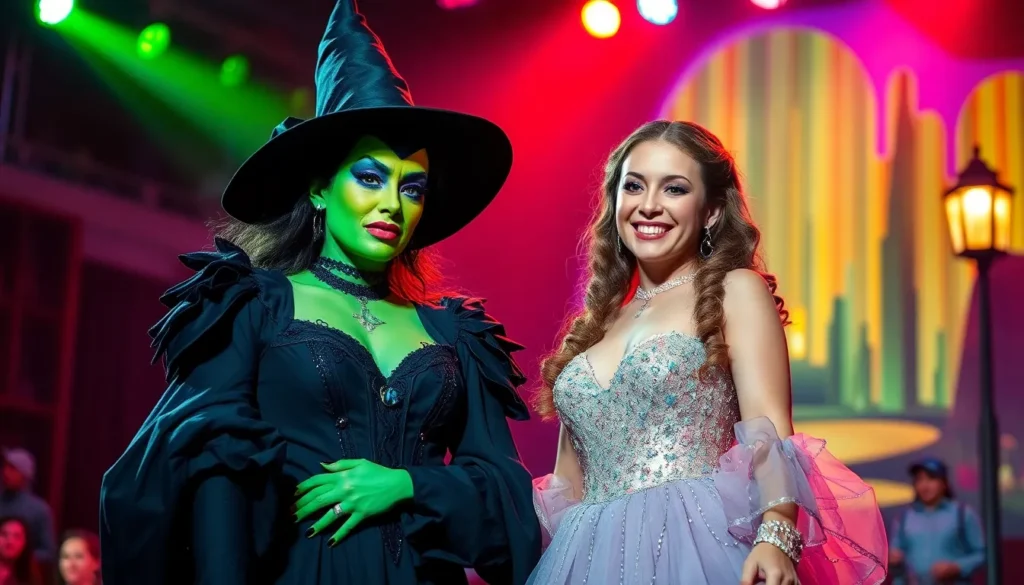The buzz surrounding the upcoming movie adaptation of “Wicked” has fans of the Broadway musical eagerly anticipating its release. But amidst the excitement, a question arises: is the movie actually a musical? With its rich narrative and memorable score, “Wicked” has captivated audiences on stage for years, telling the untold story of the witches from “The Wizard of Oz.”
As the film gears up for production, understanding its musical roots becomes essential. The original Broadway show features iconic songs that have become staples in musical theater. Exploring whether the film retains this musical essence will shed light on how it honors the beloved source material while potentially attracting a new audience.
Table of Contents
ToggleOverview of Wicked
“Wicked,” based on Gregory Maguire’s novel, is a musical that explores the complex relationship between Elphaba, the Wicked Witch of the West, and Glinda, the Good Witch. It debuted on Broadway in 2003 and soon became a cultural phenomenon due to its unique storytelling and memorable score.
The musical features a book by Winnie Holzman and music and lyrics by Stephen Schwartz. Iconic songs like “Defying Gravity,” “Popular,” and “For Good” have captivated audiences, showcasing the characters’ emotional journeys. The narrative unfolds through a lens of friendship, betrayal, and the quest for identity, inviting viewers to reconsider the traditional “Wizard of Oz” narrative.
The film adaptation aims to retain these musical elements while presenting the story in a fresh format. Casting decisions, production choices, and score arrangements hold significant importance in maintaining the essence of the original musical, ensuring that it resonates with both devoted fans and new audiences.
An exploration of the characters, their motivations, and the overarching themes reveals a rich tapestry that sets “Wicked” apart from other adaptations of classic tales. The anticipation surrounding the movie’s release demonstrates the lasting impact of its musical roots in theater and popular culture.
The Musical’s Origins

“Wicked” draws its roots from Gregory Maguire’s novel, which reimagines the lives of the witches in “The Wizard of Oz.” The story offers a new perspective, crafting complex characters that challenge familiar notions of good and evil.
The Book by Gregory Maguire
Gregory Maguire’s 1995 novel, Wicked: The Life and Times of the Wicked Witch of the West, narrates the backstories of Elphaba and Glinda. The book details Elphaba’s transformation into the Wicked Witch, highlighting her struggles against societal norms and discrimination. Through its exploration of political themes and moral ambiguity, the novel sets the stage for the musical’s deeper narrative, influencing songs that echo the characters’ experiences and emotions. The text’s rich character development and thought-provoking themes provide a solid foundation for the stage adaptation.
The Broadway Production
The Broadway production of “Wicked” premiered on October 30, 2003, in New York City. Directed by Joe Mantello and featuring a score by Stephen Schwartz, the musical quickly gained popularity. Its blend of compelling storytelling, stunning visuals, and powerful songs has thrilled audiences for over a decade. Featuring notable tracks like “Defying Gravity,” the production emphasizes themes of friendship and self-discovery. The Broadway show received numerous awards, including three Tony Awards, solidifying its status as a modern classic and strengthening its musical roots for the upcoming film adaptation. The successful integration of music and narrative underscores the importance of preserving these elements in the movie.
Plot Summary of Wicked
“Wicked” presents the complex relationship between Elphaba, the Wicked Witch of the West, and Glinda, the Good Witch. The narrative unfolds in the Land of Oz, detailing Elphaba’s metamorphosis into the Wicked Witch and the societal challenges she faces. It examines themes of friendship, acceptance, and the struggle against prejudice.
The story begins with Elphaba’s birth into a family that rejects her due to her green skin. Despite her isolation, Elphaba proves to be a passionate and intelligent character, developing a strong sense of justice. Meanwhile, Glinda, a popular and bubbly character, initially embodies the values of conformity and superficiality.
Their paths intersect at Shiz University, where their contrasting personalities create a unique dynamic. Elphaba’s activism and desire for change clash with Glinda’s pursuit of popularity, leading to a complicated friendship. The emergence of the Wizard of Oz adds another layer of complexity, revealing the political underpinnings of their society and challenging the characters’ beliefs.
As the narrative progresses, Elphaba’s transformation into the Wicked Witch symbolizes her rebellion against a corrupt system. She becomes a misunderstood figure, advocating for those oppressed by authority. The story’s climax emphasizes the moral dilemmas faced by both witches and the choices that lead to their fates.
Woven throughout the plot are powerful musical numbers that encapsulate the emotional journey of the characters. Iconic songs like “Defying Gravity” and “For Good” reinforce the themes of self-discovery and the impact of choices on relationships. Through its engaging storytelling and rich musical score, “Wicked” captivates audiences by exploring the complexities of good and evil.
Key Musical Elements
The movie adaptation of “Wicked” heavily emphasizes its musical roots, incorporating vital elements that made the Broadway version a hit. These components include impactful songs, stirring lyrics, and dynamic choreography that enhance the narrative’s depth.
Songs and Lyrics
“Wicked” features several iconic songs that convey the characters’ emotions and drive the story forward. Notable numbers include “Defying Gravity,” which highlights Elphaba’s quest for acceptance and individuality, and “Popular,” showcasing Glinda’s charming yet superficial persona. The lyrics, penned by Stephen Schwartz, reflect the complexities of friendship, social issues, and personal growth. The adaptation aims to blend these beloved songs into the film, either by preserving their original arrangements or by introducing fresh interpretations to resonate with a contemporary audience.
Choreography and Performance
Choreography plays a crucial role in “Wicked,” as it enhances the storytelling and character development through movement. The original Broadway production featured memorable dance sequences that complemented the narrative, such as the enthusiastic routines in “Dancing Through Life.” In the film adaptation, choreography will likely maintain this energetic spirit while adapting to cinematic techniques. Performances will focus on conveying emotional depth, allowing actors to embody their characters physically, which enhances the connection with viewers and supports the film’s musical elements.
Critical Reception
The movie adaptation of “Wicked” has generated considerable excitement among fans and critics alike, reflecting the ongoing anticipation for its release. Early reactions illustrate the film’s potential to honor the beloved musical while adapting it for a new medium.
Audience Reactions
Audience reactions to the film’s promotional materials indicate a strong desire for the retention of the musical’s core elements. Fans express optimism about the cast’s performances, particularly in key roles such as Elphaba and Glinda. Social media platforms show overwhelming enthusiasm for updates and teasers, with many viewers highlighting their favorite songs from the original Broadway production. Additionally, the inclusion of familiar elements, such as choreography and costumes, resonates positively with longtime fans, contributing to heightened expectations.
Reviews from Critics
Critics have responded favorably to the film’s early previews, noting the fidelity to the original musical’s themes and musicality. Reviews point to the adaptation’s rich visuals, meticulous production design, and engaging performances that enhance the narrative’s emotional depth. Critics also emphasize the importance of the iconic songs in driving the storyline forward, commending the arrangements that maintain the spirit of Stephen Schwartz’s original compositions. Overall, the critical reception suggests a promising outlook for the adaptation’s ability to capture the magic of the stage while appealing to a broader audience.
The film adaptation of “Wicked” promises to deliver a captivating blend of storytelling and music. By retaining the beloved songs that made the Broadway version a phenomenon, it aims to honor its roots while reaching a wider audience. Fans can anticipate a fresh take on iconic numbers like “Defying Gravity” and “Popular,” ensuring the emotional depth of the characters remains intact. As excitement builds, the adaptation’s potential to resonate with both longtime admirers and newcomers to the tale of Elphaba and Glinda looks incredibly promising. With a focus on dynamic performances and engaging visuals, the film is set to celebrate the enduring magic of its musical heritage.





